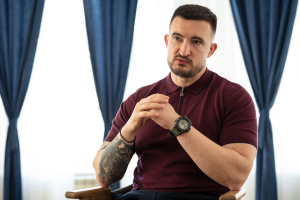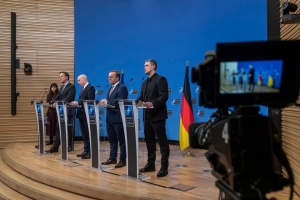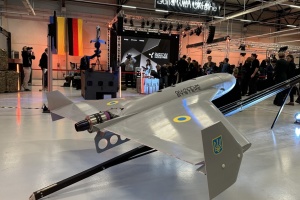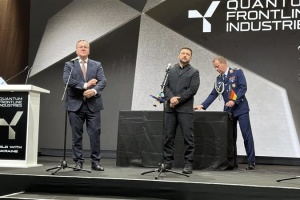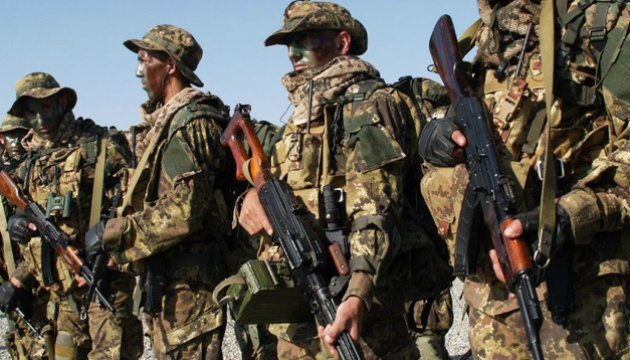
Wagner and others. Mercenaries of totalitarian regime
“Over the last years Russia has brought this practice to a new level, demonstrating that they can carry out offensive missions and actually build a backbone of an occupation army.”
“With the purpose to find the most effective combination of tools to achieve its aggressive goals, Russia tries to combine traditional military and special means with correlated activities of PMCs, mercenaries, local collaborationist forces and other paramilitary groups, such as ‘kazaki’ [Cossacks]. All of these units are integrated in joint communication and intelligence space and operates under the straight direction of Russian military command under the general military concept. The modern Russian military theory defines such approach as the “integrated force grouping.”
“Kremlin will continue to apply this highly effective hybrid approach to use forces in further military conflicts and in regions that considered as zone of Russia’s national interests. Thereby, Russia able to use such “integrated force grouping” against other sovereign states, even European nations.”
“The so-called Wagner Private Military Company is the most large-scale example of Russia's enacting of such armed units, it is the non-staff military unit of the General Directorate of the General Staff of the Russian Armed Forces, is completely under the control of Russia's top military and political command.”
These and other statements were made for the first time at the site of the Organization for Security and Co-operation in Europe (OSCE) which includes 57 countries from Europe, Central Asia and North America.
Thus, the issue of regulating the activities of private military companies (PMCs) has been raised within the OSCE before. However, for the first time, the international community was informed professionally and in detail about the Kremlin's destructive and hybrid use of PMSs for hostilities abroad.
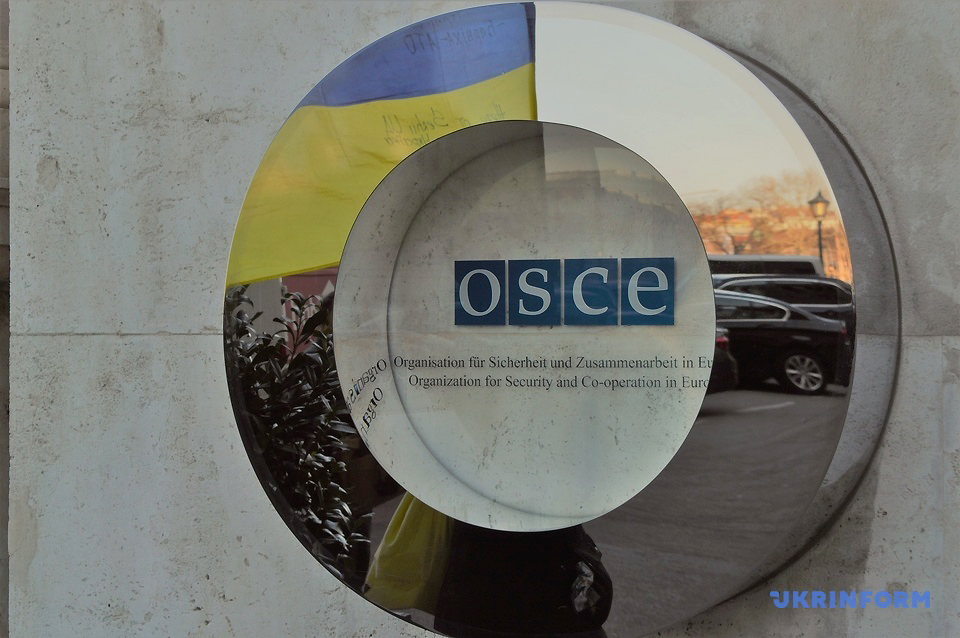
This happened on Wednesday, June 17, during the online meeting of the OSCE Forum for Security Co-operation which is currently chaired by Ukraine.
The main speaker was Vadym Skibitsky, the representative of the Main Directorate of Intelligence of the Ministry of Defence of Ukraine, who gave a comprehensive presentation on the PMCs and their role in modern military conflicts. Mykola Bezrodnov, a representative of the Security Service of Ukraine, delivered a separate report on behalf of the Ukrainian delegation to the OSCE, making a special focus on the so-called Wagner Private Military Company as the brightest example of the use of such formations by Russia.
WAGNER PMC IS NON-STAFF UNIT OF RUSSIAN ARMED FORCES
Mykola Bezrodnov, Security Service of Ukraine:
-The hybrid aggression waged by the Russian Federation on world’s democratic countries, in particular against Ukraine, includes military operations in addition to informational, political and economic activities. Along with this, Russian leadership publicly denies the presence of aggressor-country military units on the territory of other states. Prepared in advance "cover legends" are used for the information space: military personnel "on vacation", "lost", "volunteers", "private military company" upon the exposure of such armed units.
The so-called Wagner Private Military Company is the most large-scale example of Russia's enacting of such armed units, it is the non-staff military unit of the General Directorate of the General Staff of the Russian Armed Forces, is completely under the control of Russia's top military and political command.
The main difference between those armed formations enacted by the Russian Federation and true private military companies (Blackwater) is that such a company does not officially exist (not in a register of legal entities, neither in the Russian Federation, nor in any other country). Moreover, the organizational and staffing structure of Wagner Private Military Company fully corresponds to that in GRU regular units (structure of the forward tactical group - 6 companies, reinforced by tank platoons, artillery, mortars, MLRS (Multiple Launch Rocket System), anti-aircraft defense, snipers, EW (Electronic Warfare) etc). Military transport aircraft and vessels of the RF Navy are used for logistics purposes.
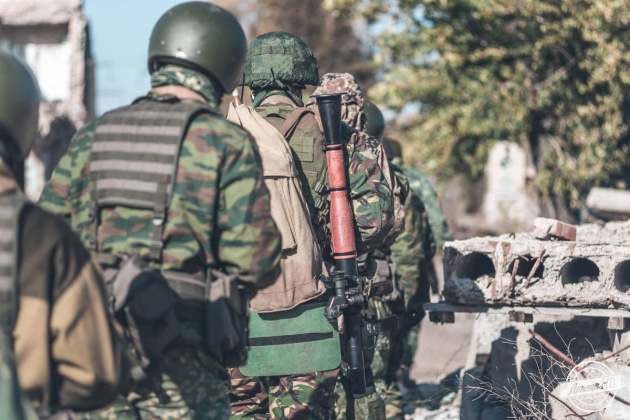
Since the end of May 2014, the so-called "Wagner group" in the status of a non-staff unit of the RF GRU began its activities in Ukraine (the downing of the IL-76 aircraft, Ukraine Air Forces, assault of the "Luhansk" airport, participation in the hostilities near Debaltseve, Sanzharivka, Utkine). At the same time, the SSU revealed that many RF citizens, who were members of Wagner Private Military Company since May 2014, entered the Autonomous Republic of Crimea through the Kavkaz-Kerch ferry in February 2014.
The Private Military Company Wagner after completing tasks on the territory of Ukraine in August 2015, was withdrawn from Ukrainian territory and in the amount of 1,350 people was transferred to Syria in support of the dictatorial regime of Assad. Subsequently, the permanent contingent of Wagner Private Military Company was increased to almost 3 thousand people.
After the field operations were reduced in Syria, part of Wagner Private Military Company units (from 1 up to 4 companies, depending on the needs of a particular period of time) were transferred to support African countries regimes of Kremlin’s geopolitical interest (Sudan, CAR), Libya and others).
The regular rotations of personnel from Syria to African countries are performed, in particular, by the "223rd Flight Detachment" of the Russian Defense Ministry. At the same time, the foreign passports were issued to personnel for cover purposes. By the way, the foreign passports issued to the Wagner staff, as well as to the GRU officers "Petrov" and "Boshirov", who carried out the terrorist attack in Salisbury, differs only in the last figures in the number.
Structures belonging to Yevhen Prigozhin are used to covertly finance Wagner Private Military Company directly from the Russian state budget. His official companies receive multibillion-dollar government profits from the RF Defense Ministry. Proceeds are used to financially support "Wagner Group" units.
PMC AS MOSCOW’S INSTRUMENT OF MILITARY INFLUENCE ABROAD
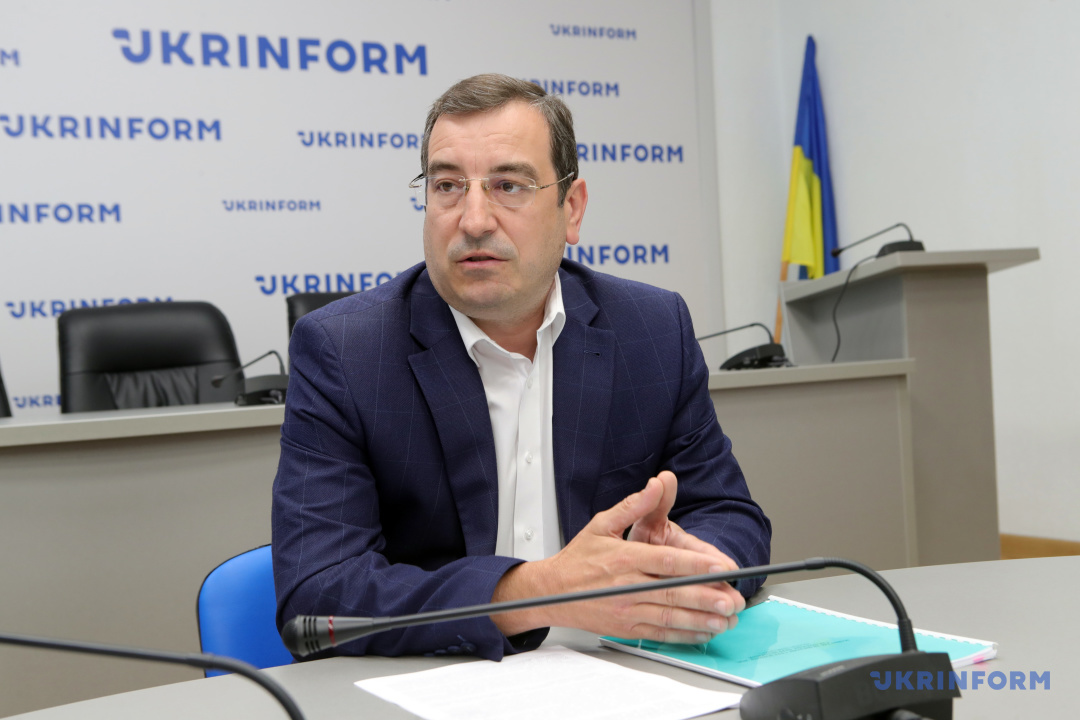
Vadym Skibitsky, Main Directorate of Intelligence of the Ministry of Defence of Ukraine:
- Using private military companies in modern world indicates the necessity for regulation of this matter at international level. We became the eyewitnesses of active participation of private military companies in countering international piracy and participation in conflict areas – in Afghanistan, Iraq, Libya, Syria and other hot spots of the world.
Unfortunately, Ukraine has its own experience related to PMCs. It is related to using military formations by Russia during occupation of Crimean peninsula and armed aggression in the East of Ukraine.
In many countries the legislation of private military companies is incomplete. At the same time, some countries establish private military companies without any legal basis at all. First of all it is about our geopolitical adversary – Russian Federation.
Despite certain illegal status of PMCs in Russia, such companies are de-facto existing and effectively acting for interests of the Kremlin, in particular – against Ukraine. Some of these formations disguise themselves as public organizations or military-patriotic clubs.
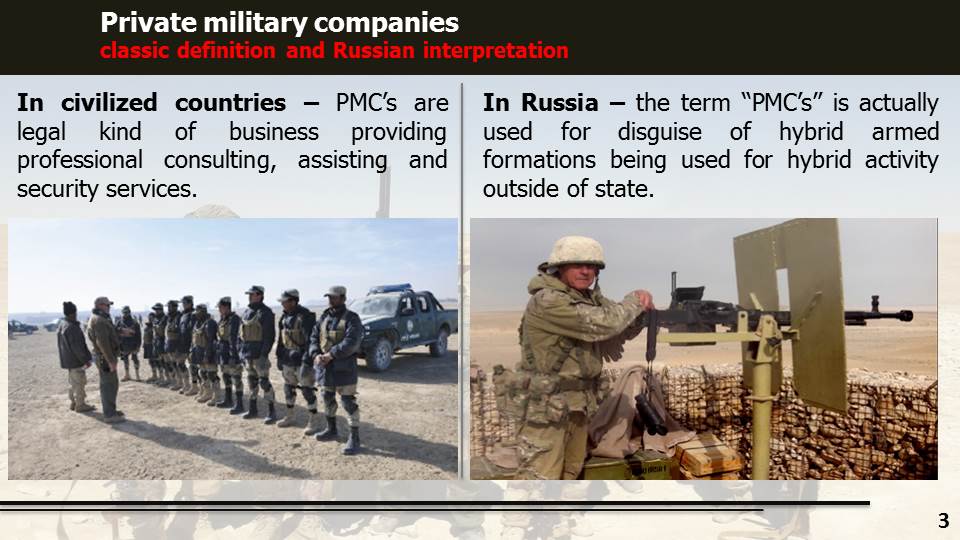
Up until recently private military companies had been considered as non-government contractors providing professional consulting, assisting and security services. Yet, Moscow is using PMCs as an instrument for providing plausibly deniable, economically and politically sustainable military influence abroad.
Over the last years Russia has brought this practice to a new level, demonstrating that they can carry out offensive missions and actually build a backbone of an occupation army.
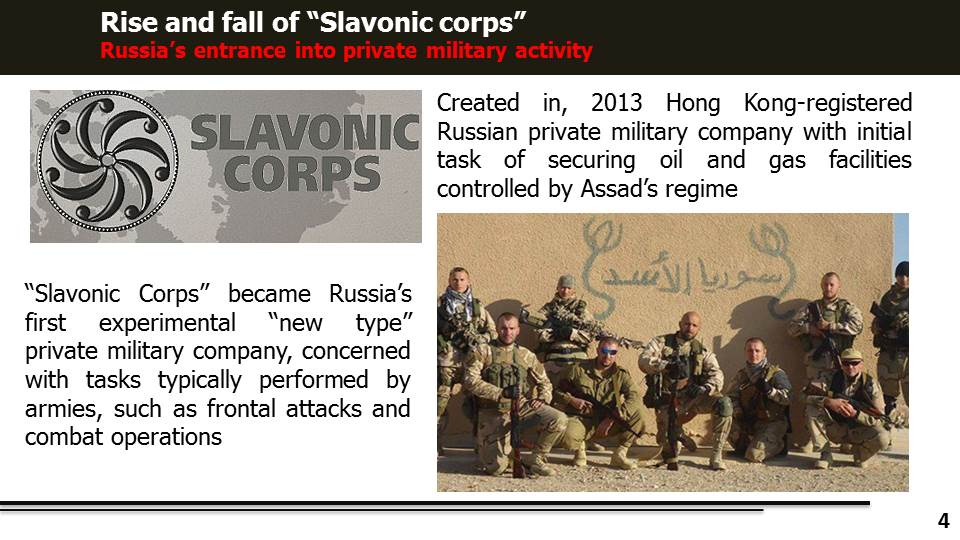 SLAVONIC CORPS AS PROTOTYPE OF WAGNER PMC
SLAVONIC CORPS AS PROTOTYPE OF WAGNER PMC
Russia’s entrance into private military operations came with the deployment of the Slavonic Corps company to Syria. Hong Kong-registered private military company Slavonic Corps was created in 2013 as the affiliated branch of another Russian PMC, “Moran Security Group”. The goal of creation was determined by agreement with the Syrian government which included protecting Assad regime assets such as oil and gas facilities. As far as leaders of “Moran Security Group” were seeking to avoid sanctions and reputational losses for interacting with Assad, Slavonic corpse was established as a proxy-force and, at the same time, a “pilot project” to test the ground.
Slavonic Corps became Russia’s first and, in many ways, rather experimental “new type” private military company, concerned with tasks typically performed by armies, such as frontal attacks and combat operations—in contrast with Western PMCs, which are mainly assigned auxiliary or training roles. Despite first unsuccessful experience of using private military companies, Russia learnt its lessons and used the case of Slavonic corps for further creation of more effective non-government military formation – PMC “Wagner”.
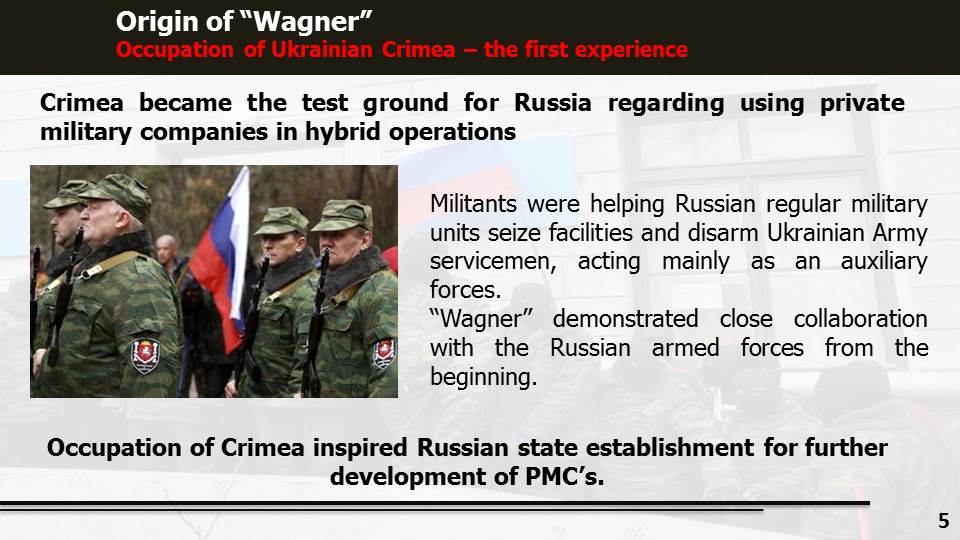
OCCUPATION OF CRIMEA, WAGNER, E.N.O.T. AND OTHERS
During seizing Crimea by force in 2014 Russian private military companies were in their forming state and couldn’t be a cover for so-called “self-defense of Crimea”, “kazaki” [Cossacks] and other pro-Russian radical groups and formations. At the same time, they were acting together with special operations forces and airborne troops subunits of Russian armed forces, under one concept and one command.
The Russian armed aggression at the east of Ukraine showed the effectiveness and importance of the PMCs. During the first stage, their main task was stirring and further destabilizing the situation, provoking its escalation from political confrontation to a phase of direct violence and hostilities.
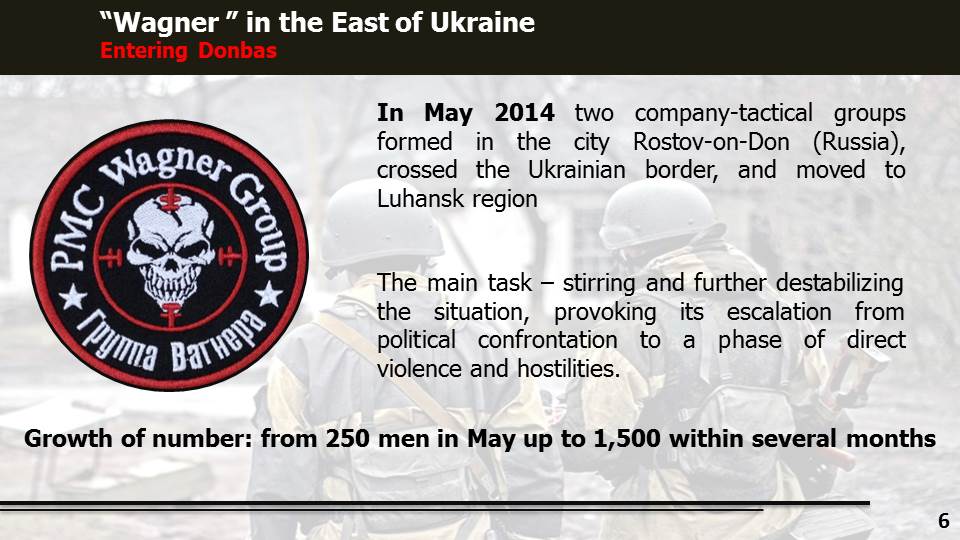
The number of the men in PMCs grew with the increasing of tasks. Since May, 2014 PMC “Wagner” increased from 250 to 1500 men within several months at the east of Ukraine. It took part in terrorist and sabotage activity against the Ukrainian Armed Forces.
There are confirmed facts of PMC “Wagner” participation in the battle for Luhansk airport (April-September, 2014), Sanzharivka (January, 2015) and Vergulivka (February, 2015). 250 PMC “Wagner” members took part in combat actions near Debaltseve from January 14, 2015 till February 20, 2015.
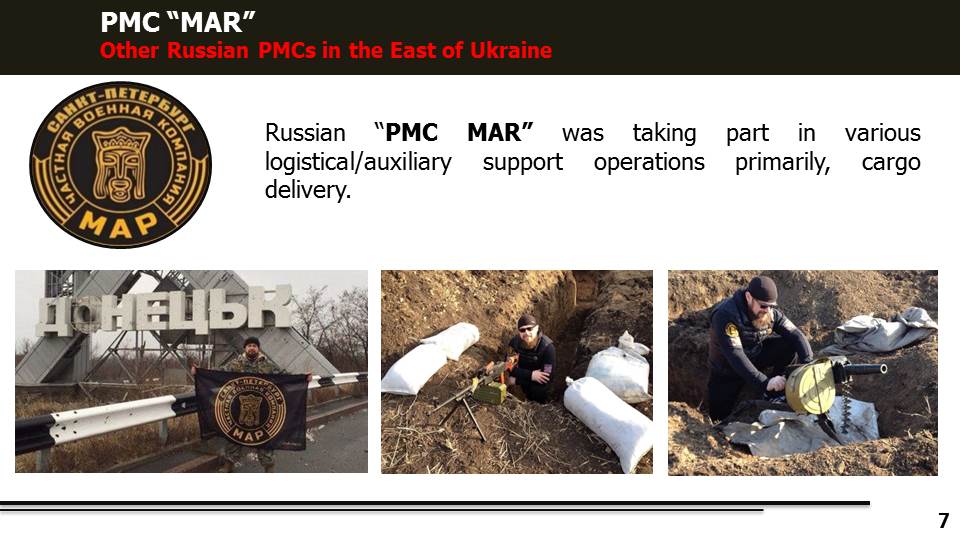 There are also other Russian PMCs, which were present at the east of Ukraine. PMC “MAR”, that is registered in Sankt-Peterburg, took part in various logistical/auxiliary support operations primarily, cargo delivery including munitions and military equipment.
There are also other Russian PMCs, which were present at the east of Ukraine. PMC “MAR”, that is registered in Sankt-Peterburg, took part in various logistical/auxiliary support operations primarily, cargo delivery including munitions and military equipment.
Other Russian PMC “E.N.O.T. Corp” conducted both combat actions and non-combat operations. The last ones are armed support of the Russian so-called “humanitarian convoys” (14 missions). Also “E.N.O.T. Corp” took part in combat actions near Chornukhyne (Luhansk region) and Debaltseve (Donetsk region).
Moscow uses PMCs for recruiting, training and equipping mercenaries, increasing its hybrid expansion in Ukraine and all over the world.
PMC’s fighters are trained at Molkino military firing range (near KRASNODAR city) – conventional training area for Russian 10th special operations brigade and PMC “Wagner”.
Russian PMCs usually recruits fighters in Russia and from ex-Soviet states. Many mercenaries were recruited from temporary occupied territories of Ukraine – Donbas area and Crimea.
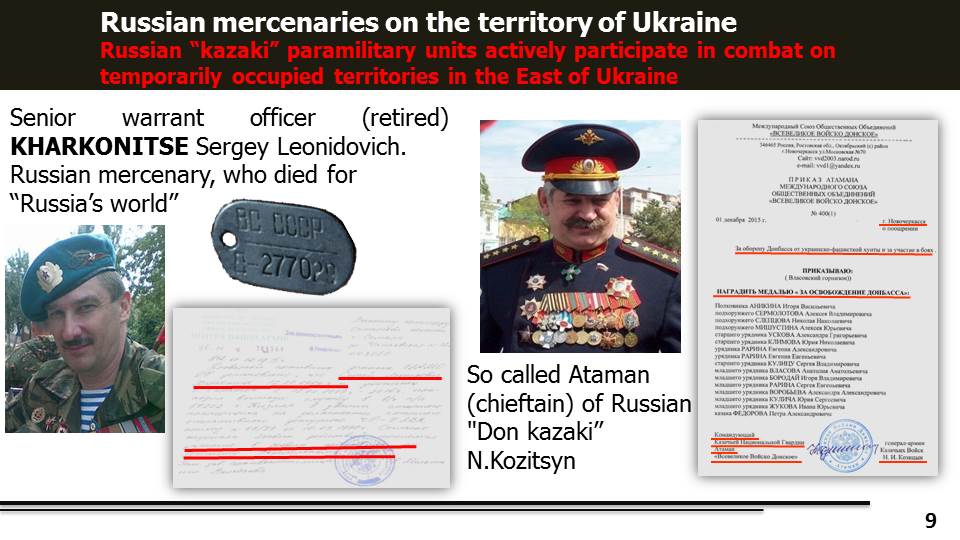
CONCEPT OF INTEGRATED FORCE GROUPING
With the purpose to find the most effective combination of tools to achieve its aggressive goals, Russia tries to combine traditional military and special means with correlated activities of PMCs, mercenaries, local collaborationist forces and other paramilitary groups, such as “kazaki” [Cossacks].
All of these units are integrated in joint communication and intelligence space and operates under the straight direction of Russian military command under the general military concept. The modern Russian military theory defines such approach as the “integrated force grouping”. We have witnessed such kind of Russian activities in Ukraine, Syria and Libya.
Combat experience of PMCs involvement in Ukraine and Syria gives the Kremlin ability to use this tool to project Russia’s influence in other regions.
Russia is able to use such “integrated force grouping” against other sovereign states, even European nations. The next practice of such combined forces approach we will see this September during the “KAVKAZ-2020” strategic command and staff exercise.
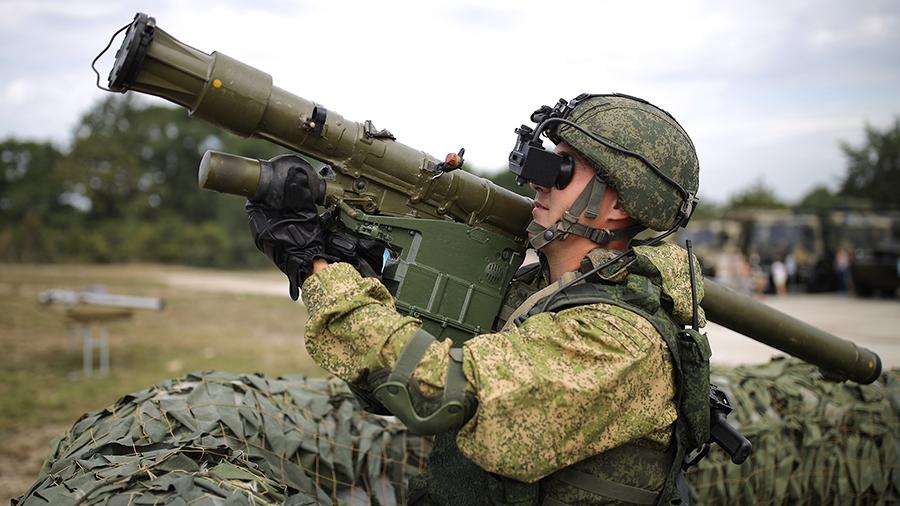
The Russian PMCs evolve fast and nowadays they are almost the same as units of the armed forces. In fact, they are cheap regular forces that have no social protection of the state. There are indicators that Moscow is not going to decrease the usage of PMCs for the next several years.
Nowadays the Russian PMCs are growing fast in numbers and capabilities; they are widening their footprint and increasing their influence. As well as they are becoming more financially strong and get more and more funds from hidden governmental and non-governmental sources. In the future, the Kremlin will widen the usage of such proxy-forces for its interests’ implementation and undermining the international stability.
* * *
Basing on things considered, the international community has to work ways to counter hybrid armies under PMC disguise.
There is an urgent need to institute an international authority that would establish unified rules and provide strict control over PMCs.
It would be wise to clearly define PMCs in the international law, including the Rome Statute.
All countries should take a hard stand against mercenarism. United Nations Mercenary Convention has only been ratified by 35 countries and it is largely unable to respond to new challenges.
And finally, the free world should increase pressure on Russia and other countries waging hybrid wars through the employment of PMCs and other paramilitary organizations.
Vasyl Korotkyi, Vienna

